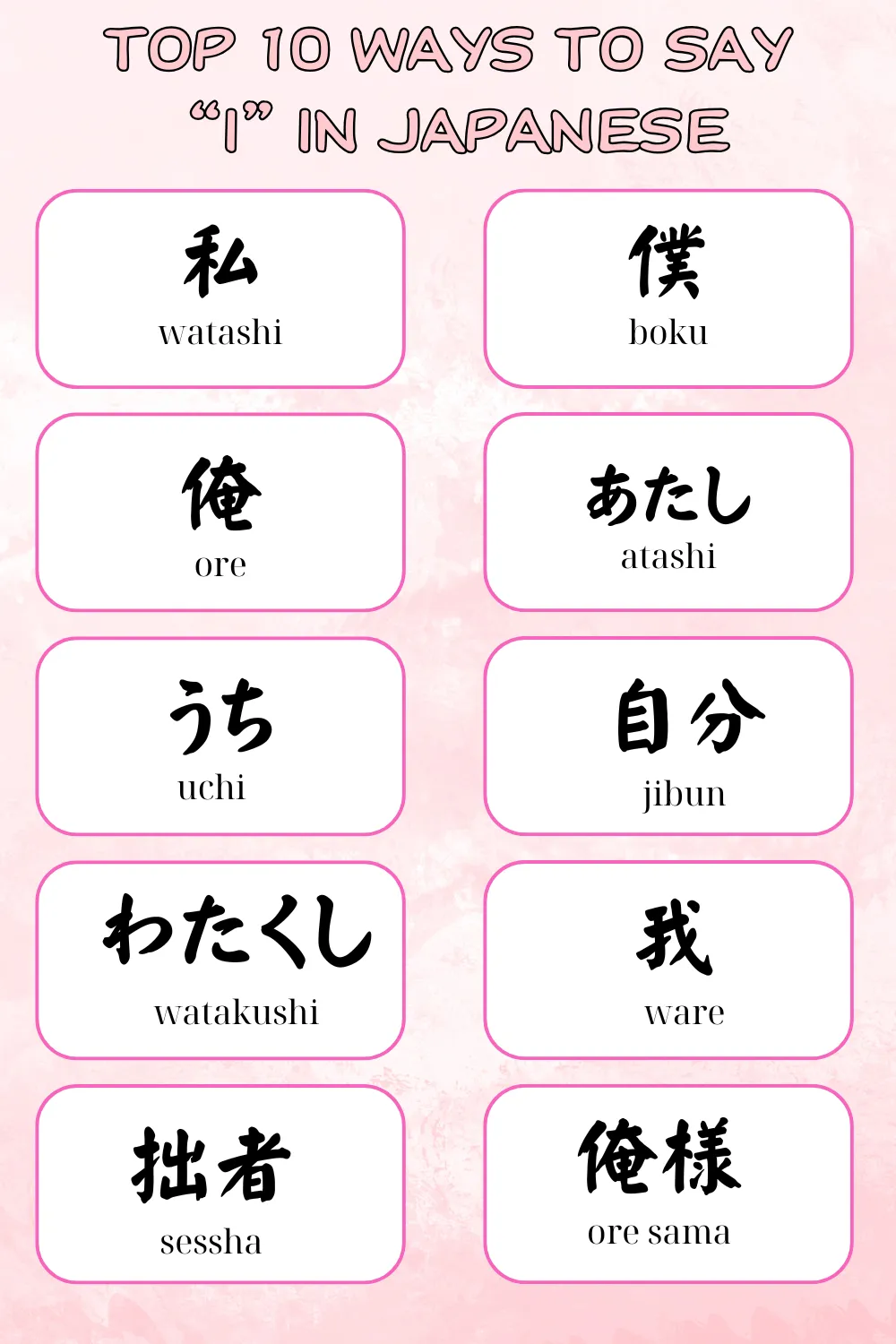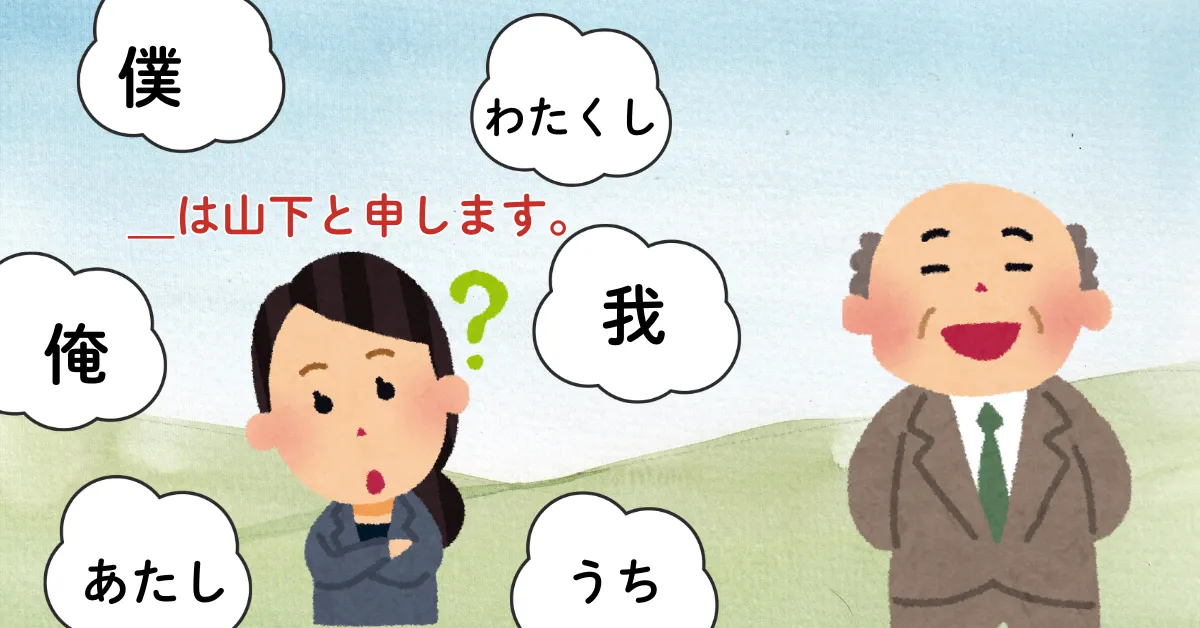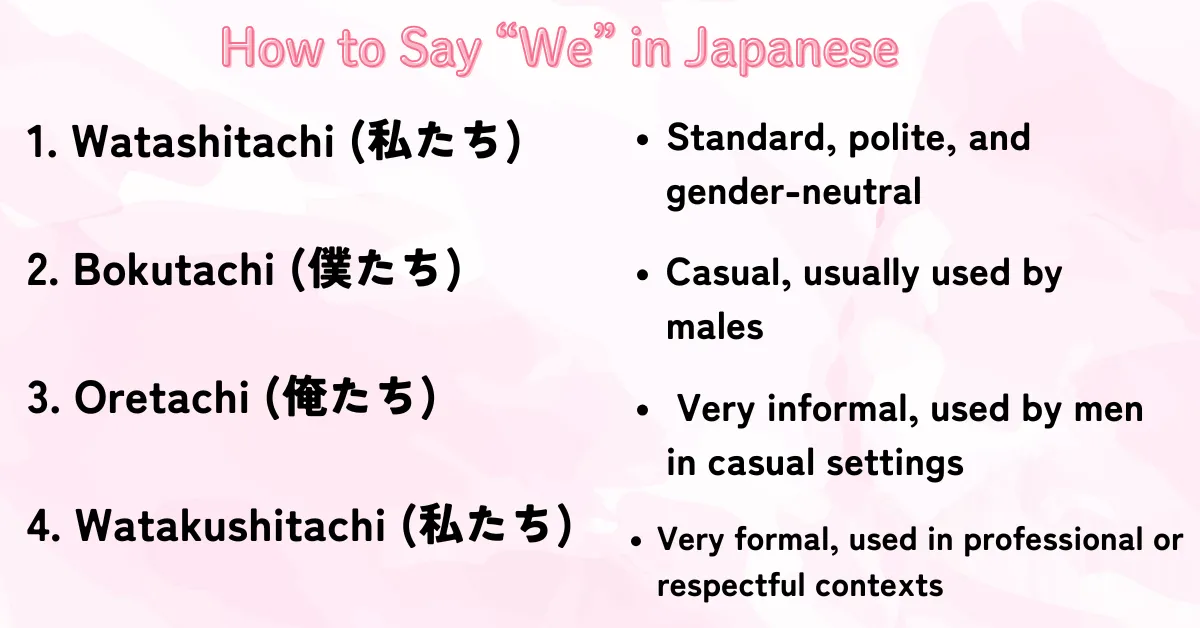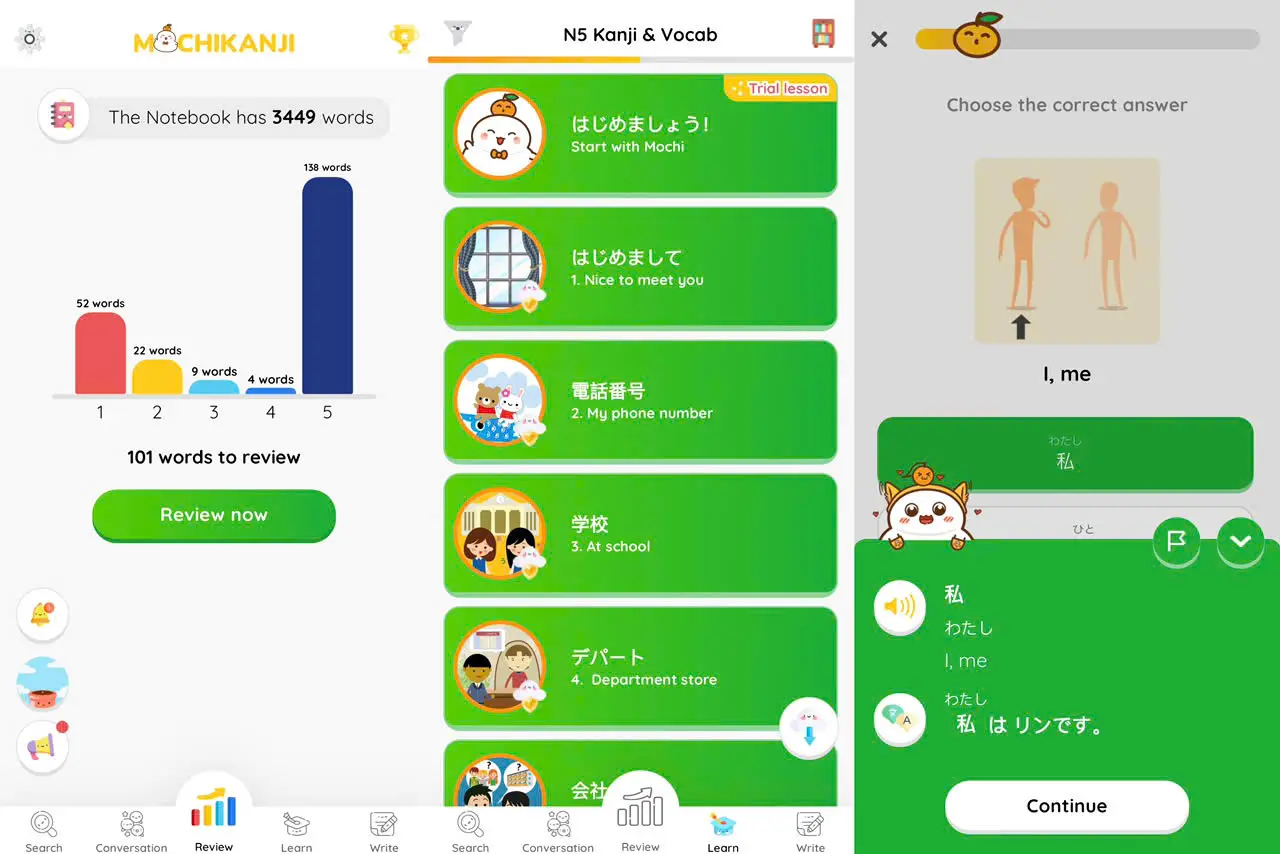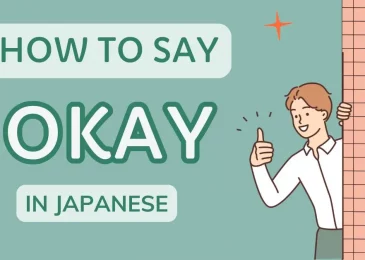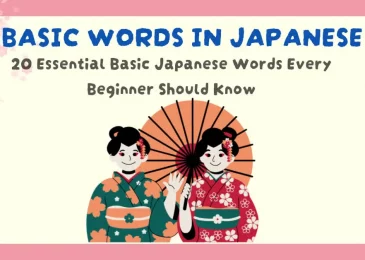When learning Japanese, understanding how to say “I in Japanese” is more than just picking a word—it’s about grasping cultural nuances. The pronoun you use depends on formality, gender, and context, reflecting Japan’s rich language and social layers. Let’s dive into the 10 most common ways to say “I in Japanese” and how to use them!
Understanding “I” in Japanese
In Japanese, the word for “I” isn’t as straightforward as it is in English. While English uses a single, universal pronoun for self-reference, Japanese offers a variety of words to express “I in Japanese,” each carrying distinct nuances. The choice of pronoun reflects not only the speaker’s gender but also the level of formality, relationship dynamics, and even regional preferences.
This complexity highlights Japan’s deep cultural emphasis on hierarchy and situational awareness. Whether you’re in a business meeting, chatting with friends, or portraying a character in anime, your pronoun choice can influence how others perceive you. Mastering how to say “I in Japanese” is essential for connecting authentically with native speakers.
Top 10 Ways to Say “I” in Japanese
Below are the 10 most common ways to express “I in Japanese” along with examples:
1. Watashi (私)
The most versatile pronoun, watashi, is polite and gender-neutral. It’s suitable for both formal situations and everyday conversations, especially for women.
Example: 私は田中です。Watashi wa Tanaka desu. (I am Tanaka.)
2. Boku (僕)
A modest and slightly masculine term, boku is commonly used by men, particularly in informal or neutral settings. It conveys a sense of humility and friendliness.
Example: 僕は日本語を勉強しています。Boku wa nihongo o benkyou shiteimasu. (I am studying Japanese.)
3. Ore (俺)
Casual and masculine, ore is used among friends or in relaxed settings. It expresses confidence but can come across as rude in formal contexts.
Example: 俺は行くよ。(Ore wa iku yo.) – I’m going.
4. Atashi (あたし)
A feminine and casual version of watashi, atashi is often used by women in informal conversations. It adds a soft, personal touch to speech.
Example: あたしは映画が大好きです。Atashi wa eiga ga daisuki desu. (I love movies.)
5. Uchi (うち)
This regional pronoun, particularly popular in Kansai dialect, is informal and gender-neutral. It’s commonly used by young women or in casual settings.
Example: うちは今日友達と遊んだ。Uchi wa kyou tomodachi to asonda. (I hung out with my friends today.)
6. Jibun (自分)
Meaning “oneself,” jibun is flexible and used to express humility or self-reflection. It’s frequently used in teamwork or sports contexts.
Example: 自分の夢をあきらめない。Jibun no yume o akiramenai. (I won’t give up on my dream.)
7. Watakushi (私)
An ultra-polite version of watashi, watakushi is reserved for formal speeches, business meetings, or interviews. It’s commonly used in professional or respectful scenarios.
Example: わたくしは田中と申します。Watakushi wa Tanaka to moushimasu. (I am Tanaka.)
8. Ware (我)
Ware feels archaic and is rarely used in modern speech. It often appears in literature, historical dramas, or poetic expressions.
Example: 我は日本の歴史に興味がある。Ware wa nihon no rekishi ni kyoumi ga aru. (I am interested in Japanese history.)
9. Sessha (拙者)
This humble, old-fashioned term means “this unworthy person” and is associated with samurai or historical settings.
Example: 拙者はしのびだと思いました。Sessha wa shinobi da to omoimashita. (I thought I was a ninja.)
10. Ore-sama (俺様)
An exaggerated, arrogant version of ore, ore-sama is used humorously or in fictional contexts to convey superiority.
Example: 俺様は最強だ。Ore-sama wa saikyou da. (I am the strongest!)
How Context Affects Pronoun Choice
The choice of “I in Japanese” depends on gender, age, and social hierarchy. Depending on the context, using the right pronoun can show respect, maintain proper relationships, or convey specific emotions. Here’s how context shapes your choice of pronoun:
Formal Situations:
In professional or formal settings, you’re expected to use more polite forms of “I.” Watashi (私) or the ultra-polite watakushi (私) are appropriate in these cases, showing respect to others and fitting the hierarchical nature of many Japanese conversations.
Friendly Chats:
When speaking with friends or in informal situations, men might use ore (俺), a more confident and casual way of saying “I,” while women often use atashi (あたし) to maintain a casual yet feminine tone.
Team Settings or Humble Contexts:
In group activities, especially in sports or teamwork, jibun (自分) is frequently used to show humility and a sense of shared effort. It indicates that the speaker is thinking about themselves in a broader, collective context rather than focusing on individual pride.
Example Scenarios
- At Work: When introducing yourself in a formal business meeting or interview, you would use watakushi to show respect and politeness.
Example: わたくしは山下と申します (Watakushi wa Tanaka to moushimasu.) — I am Yamashita.
Using watakushi in a formal business meeting to show respect
- Casual Meetup: In a casual setting with friends or peers, you might use ore to sound more relaxed and confident.
Example: 俺は田中だ (Ore wa Tanaka da.) — I’m Tanaka.
- Team Context (Humility): In a group or team scenario, like sports or a collaborative project, jibun is often used to convey that you are part of the team, rather than focusing on yourself.
Example: 自分はみんなを助ける (Jibun wa minna o tasukeru.) — I will help everyone.
How to Say “We” in Japanese
Here’s a shorter version of how to say “we” in Japanese:
1. Watashitachi (私たち)
- Meaning: Standard, polite, and gender-neutral.
- Example: Watashitachi wa gakusei desu (私たちは学生です) – “We are students.”
2. Bokutachi (僕たち)
- Meaning: Casual, usually used by males.
- Example: Bokutachi wa eiga o mi ni ikimasu (僕たちは映画を見に行きます) – “We are going to watch a movie.”
3. Oretachi (俺たち)
- Meaning: Very informal, used by men in casual settings.
- Example: Oretachi wa asobimasu (俺たちは遊びます) – “We will hang out.”
4. Watakushitachi (私たち)
- Meaning: Very formal, used in professional or respectful contexts.
- Example: Watakushitachi wa kono mondai o kaiketsu shimasu (私たちはこの問題を解決します) – “We will solve this problem.”
Practice Tips for Mastery
When learning Japanese, understanding the different ways to say “I” is a key component. Japanese has various ways to refer to oneself, and each form can reveal nuances in the speaker’s personality, formality, or relationship with the listener. Here are some practice tips to master not only the use of “I” in Japanese but also your overall language learning:
1. Understand the Different Ways to Say “I”
In Japanese, the word “I” can vary depending on the context and the speaker’s identity. Knowing when and how to use these variations will make your conversations sound more natural and appropriate.
2. Consistent Daily Practice
Just like mastering different ways to say “I,” consistent practice is the foundation of your Japanese skills. Dedicate at least 15 minutes a day to reviewing vocabulary and grammar.
3. Focus on Vocabulary Expansion
To sound natural in conversations, it’s essential to expand your vocabulary beyond basic phrases like “I.” MochiKanji helps you learn Kanji fast, and memorize 1000 Japanese words effectively with a joyful learning experience. MochiKanji tracks your learning progress and prompts you to review during the Golden Time—just before forgetting kicks in. This smart approach helps you retain new words up to ten times more efficiently.
With just 15 minutes a day, MochiKanji fits seamlessly into your routine, letting you study anytime, anywhere.
It also makes memorization both effective and enjoyable by combining interactive games with vivid images and audio, which enhance your ability to retain new information. The app categorizes words based on your memory level, allowing you to focus only on the words you need.
This app will help you master kanji, vocabulary, and more—making your journey to fluency easier and more enjoyable!
5. Master Japanese Grammar
Understanding sentence structure and grammar is essential when using words like “I” in Japanese. For example, the placement of “I” in a sentence can vary based on politeness levels or the relationship between speakers.
Conclusion
Mastering “I in Japanese” will deepen your understanding of the language and culture. By learning its variations and proper usage, you’ll communicate more naturally and respectfully in any situation!

